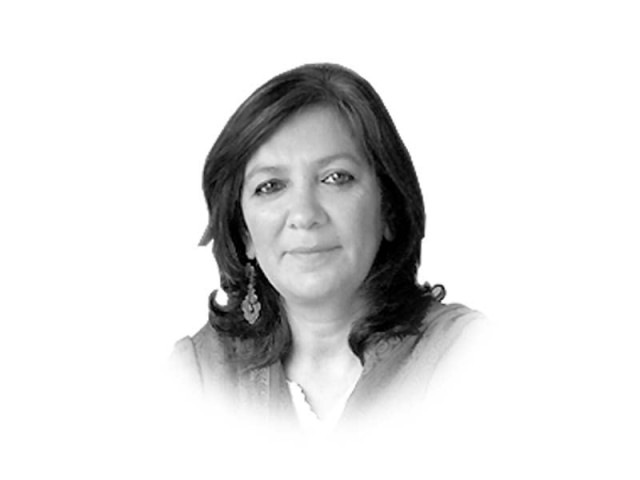The man from Jati Umra
I have come to believe in these last 48 hours that Modi and Nawaz Sharif need each other.

The writer is an independent journalist based in New Delhi and writes for several Indian newspapers
In this era of social media — when Modi’s team uploaded a message on his Twitter page the minute he was sworn in as India’s 15th prime minister — it was only appropriate that someone as savvy as Maryam Sharif tweeted the gist of the much-awaited Modi-Nawaz meeting as soon as her father spoke to the media in Delhi. Why wait for the newspaper to be printed a whole day later?
Indian PM Modi refers to PM Sharif as 'MAN OF PEACE'.... Hope negativity fails and peace wins...
— Maryam Nawaz Sharif (@MaryamNSharif) May 27, 2014
Modi referred to Nawaz Sharif as a “MAN OF PEACE”, Ms Sharif said, the capitals giving away the tension and the relief that must have been accompanied the Pakistan prime minister and his entourage’s visit to India. Sharif, himself, delivered an exquisitely worded statement on how he looked forward to picking up the thread of the relationship that had petered out in 1999, in a spirit of cooperation not competition, and that the foreign secretaries had been directed to meet very soon to do exactly that.
Is this Sharif’s moment that will assure him his place in history? The fact that he bucked pressure from the ‘establishment’ back home to come to India — even though Pakistani analysts denied that there had been any such thing — shook hands with the man who was in charge in Gujarat when at least 1,000 Indian Muslims were killed, and offered to make peace with the Hindu nationalist, right-wing Bharatiya Janata Party government that has barely come to terms with the fact that Pakistan is an independent nation, meant that the man from Jati Umra meant to show the world that he was no pushover.
All this was supposed to be the stuff of a Prakash Jha potboiler, and yet, here was Nawaz Sharif pronouncing the outlines of a possible future peace agreement.
What about Modi himself? Did he actually call Nawaz Sharif a ‘man of peace’ and other such sweet nothings in their 50-minute meeting in Hyderabad House? Did the Rashtriya Swayamsevak Sangh (RSS), the mother organisation, which is replete with the fervour of ‘akhand Bharat’ and its attendant delicacies, squirm when Maryam’s tweet was broadcast to the world?
Remember that India’s newest prime minister kept quiet when the newly minted member of parliament from Nawada constituency in Bihar, Giriraj Singh, said during the election campaign that all those who disagreed with a certain Narendra Modi could pack their bags and go to Pakistan. Remember that the woman sitting by Modi’s side when he met Nawaz, India’s external affairs minister Sushma Swaraj, had asked for 10 Pakistani heads in place of the one allegedly beheaded by Pakistani soldiers on the Line of Control last year.
How times change. The same Sushma Swaraj, attending a Saarc information ministers’ meeting in Pakistan in 2002, in the wake of the attacks against the Indian parliament on December 13, 2001 that were allegedly carried out by Pakistan-trained terrorists, both charmed and outwitted the Pakistani media in the chastest Urdu.
Certainly, over the past couple of days, the Modi-Nawaz handshake has become such a poignant symbol of the essential dichotomy that drives the India-Pakistan relationship that it threatened to overshadow the swearing-in ceremony of Narendra Modi himself.
I have come to believe in these last 48 hours that Modi and Nawaz Sharif need each other. Modi, I suspect, may have even used the cascading Sharif bonhomie in India to show to the RSS who is boss — him, not all those men with sweet, walrus moustaches who live in Nagpur and hope to run the country from there.
As for Nawaz Sharif, by referring to the unfortunate breakdown in 1999 to the India-Pakistan peace process, to the ugly hijacking of the democratic peace process by then General Pervez Musharraf, to the invasion of India at Kargil, he was probably telling Modi — as well as the rest of the Indian establishment — that he needs Delhi’s help to take on his own not-so-democratic opponents back home.
Of course, Modi will also invoke the RSS bosses when he wants to, for example, when the new minister in the prime minister’s office, Jitendra Singh, announced on May 27 that it may be time to take another look at Article 370 that accords special status to Jammu & Kashmir in the Indian Union.
The old order is changing. On the 50th anniversary of Jawaharlal Nehru’s death, the idea of India is slowly but surely moulting. Another idea of India is coming to take its place, one in which Hindu icons like Vinayak Damodar Savarkar and Deen Dayal Upadhyaya are being dusted off their cobwebs and given pride of place alongside the Congress party’s secular heroes. After all, this is their India too.
Published in The Express Tribune, May 29th, 2014.
Like Opinion & Editorial on Facebook, follow @ETOpEd on Twitter to receive all updates on all our daily pieces.















COMMENTS
Comments are moderated and generally will be posted if they are on-topic and not abusive.
For more information, please see our Comments FAQ